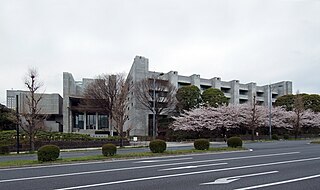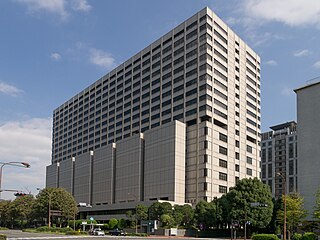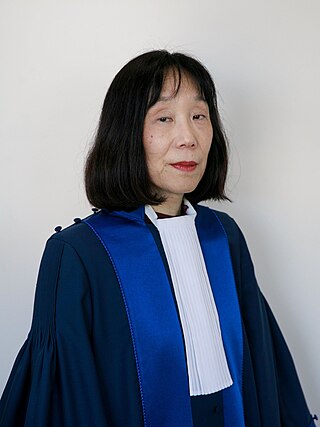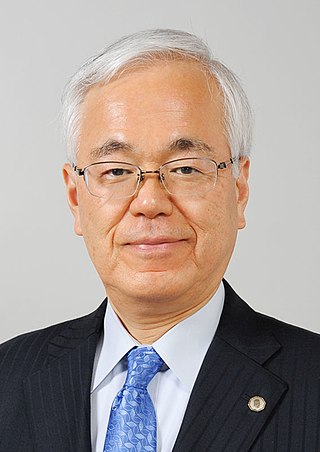Related Research Articles

The Kobe child murders occurred in Suma, Kobe, Japan, on March 16 and May 27, 1997. Two victims, Ayaka Yamashita, aged 10, and Jun Hase, aged 11, were murdered by a 14-year-old boy reportedly named Shinichiro Azuma, under the alias Seito Sakakibara.

The Supreme Court of Japan, located in Hayabusachō, Chiyoda, Tokyo, is the highest court in Japan. It has ultimate judicial authority to interpret the Japanese constitution and decide questions of national law. It has the power of judicial review, which allows it to determine the constitutionality of any law or official act.

In the judicial system of Japan, the Constitution of Japan guarantees that "all judges shall be independent in the exercise of their conscience and shall be bound only by this constitution and the Laws". They cannot be removed from the bench "unless judicially declared mentally or physically incompetent to perform official duties", and they cannot be disciplined by executive agencies. Supreme Court judges, however, may be removed by a majority of voters in a referendum that occurs at the first general election following the judge's appointment and every ten years thereafter. The judiciary was far more constrained under the Meiji Constitution than it is under the present Constitution and had no authority over administrative or constitutional law cases. Moreover, the Ministry of Justice had complete and direct control over the courts' administrative affairs. Nonetheless, Professor John Haley argues that the courts maintained complete independence in the adjudication of particular cases. "Judicial independence from the political branches was emphatically established as a fundamental principle of governance in Article 57 of the Meiji Constitution. Of all branches of government only the courts exercised authority 'in the name of the Emperor'." Haley argues that this was and remains a matter of great pride for Japanese judges and notes that "placed prominently in all courtrooms was the inscription 'in the name of the Emperor' as a meaningful reminder to imperial officials and subjects alike that the Emperor's judges were not subject to political control or direction."

Capital punishment is a legal penalty in Japan. In practice, it is applied only for aggravated murder, but the current Penal Code and several laws list 14 capital crimes, including conspiracy to commit civil war; conspiracy with a foreign power to provoke war against Japan; murder; obstruction of the operation of railroads, ships, or airplanes resulting in the death of the victim; poisoning of the water supply resulting in the death of the victim; intentional flooding; use of a bomb; and arson of a dwelling; all resulting in the death of the victim. Executions are carried out by long drop hanging, and take place at one of the seven execution chambers located in major cities across the country.
This is a list of landmark cases of the Supreme Court of Japan.
The Administrative Litigation Act is a Japanese statute enacted in 1962 which governs lawsuits involving the government of Japan. It overlays the Code of Civil Procedure, and the Code governs such cases to the extent the Act is silent.

Naoto Ōtani is a Japanese jurist and lawyer who served as the 19th Chief Justice of the Supreme Court of Japan from 2018 to 2022.
Christine Elyse Keller is an American lawyer and judge from Connecticut. She is a Senior Justice of the Connecticut Supreme Court.

Bridget Anne Shelton Bade is an American lawyer and jurist from Arizona. She is a United States circuit judge of the United States Court of Appeals for the Ninth Circuit. She was formerly a United States magistrate judge of the United States District Court for the District of Arizona.
Carla Wong McMillian is an associate justice of the Supreme Court of Georgia and former judge of the Georgia Court of Appeals.
Samuel Kofi Marful-Sau was a Ghanaian judge. He was an active justice of the Supreme Court of Ghana.

Tomoko Akane is a Japanese jurist and a current judge at the International Criminal Court (ICC) for Japan, as well as the president of the court.
Hiroyuki Kanno is a Japanese jurist who served as an associate Justice of the Supreme Court of Japan from 2016 to 2022.

Saburo Tokura is a Japanese jurist who has served as the Chief Justice of Japan since June 2022, having previously served as an Associate Justice on the Supreme Court of Japan from 2017 to 2022.
Katsuyuki Kizawa is a Japanese jurist who served as an associate Justice of the Supreme Court of Japan from 2016 to 2021.
Michiharu Hayashi is a Japanese jurist who has served as an associate Justice of the Supreme Court of Japan since 2019.
Masayuki Ikegami is a Japanese jurist who served as an associate Justice of the Supreme Court of Japan from 2014 to 2021.
Koichi Kusano is a Japanese jurist who has served as an associate justice of the Supreme Court of Japan since 2019.
Kazumi Okamura is a Japanese jurist who has served as an associate justice of the Supreme Court of Japan since 2019.
Ryosuke Yasunami is a Japanese jurist who has served as an associate Justice of the Supreme Court of Japan since 2021.
References
- ↑ Martindale-Hubbell International Law Directory. Martindale-Hubbell. 1998. ISBN 9781561602759.
- 1 2 "裁判所|MIYAZAKI Yuko". Courts in Japan. Archived from the original on October 17, 2020. Retrieved May 26, 2023.
- ↑ Trickey, Erick (23 January 2019). "A Pioneer's Logic". Harvard Law Today. Retrieved 2019-09-05.
- ↑ The Tax Management International Forum. Tax Management International. 2002.
- ↑ "New Supreme Court justice sees no problem with elective dual-surname system". Mainichi Daily News. 2018-01-10. Retrieved 2019-09-05.
- 1 2 Osumi, Magdalena (2018-01-10). "Newly minted Japanese Supreme Court justice will issue rulings under maiden name, breaking with long tradition". The Japan Times Online. ISSN 0447-5763 . Retrieved 2019-09-05.
- ↑ Kingston, Jeff (2019-02-18). Critical Issues in Contemporary Japan. Routledge. ISBN 9781351139625.
- ↑ "Former Justices | 裁判所 - Courts in Japan". www.courts.go.jp. Retrieved 2023-05-26.
- ↑ "Media release: Appointments, extension of appointments and reappointments of Supreme Court judges and international judges to the Singapore International Commercial Court". Supreme Court of Singapore. 2021-11-15. Retrieved 2021-11-15.
- ↑ 市町村長処分不服申立て却下審判に対する 抗告棄却決定に対する特別抗告事件(Supreme court of Japan2021),[/ https://www.courts.go.jp/app/files/hanrei_jp/412/090412_hanrei.pdf Text].